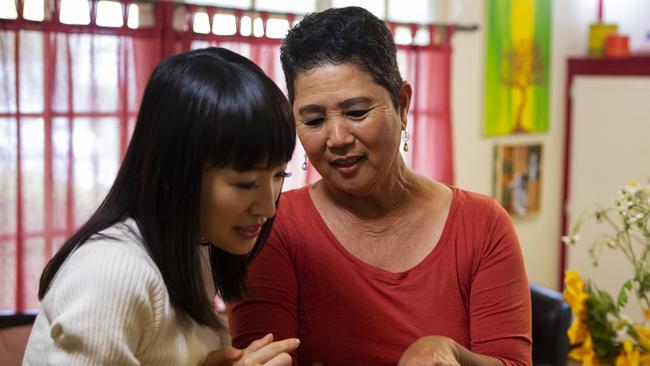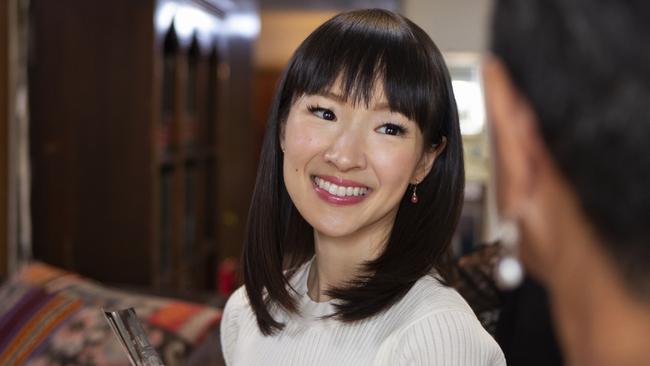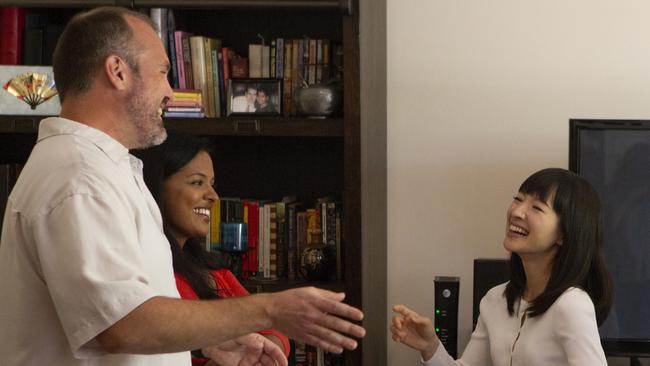Why Marie Kondo isn’t sparking joy among feminists
A show about decluttering our homes is now being used to hold a light up to the division of household chores by feminists. Is this really where we’re at now, asks Louise Roberts.
Rendezview
Don't miss out on the headlines from Rendezview. Followed categories will be added to My News.
Marie Kondo is a pioneer of the tidy life, a beacon of calm and order for the rest of us slobs drowning in our own clutter.
It’s hypnotic to watch her fold a T-shirt into a crease-free rectangle so it can be stored standing up on its own.
It’s a skill I was blissfully oblivious to until I was introduced to the online organising guru by girlfriends and decided to check out her videos.
While I was instantly hooked on the softly-spoken Kondo and her mission to help us all be neat, in a sign of the times, she has found herself in the crosshairs of the feminist blame brigade.
According to these warriors of progress Kondo — all 140cm of her — is no innocent organiser but instead a sinister front woman for the “emotional labour” of gendered housekeeping and the battle of the sexes.
In their world, women do everything and men, parked on their fat, sofa-cushioned behinds, whinge with indignation: “You should’veasked! I would have helped!” in relation to doing any chore around the home.
There they are, those lazy men watching time tick by as an “employee” of the wife while they wait for a list of jobs.
RELATED: We don’t need Marie Kondo, we need self-control
Can you see that going on in your home? Me neither.
Critics keen to keep fighting the good feminist fight say Kondo is not telling us how to manage our stuff. No, instead she is dishing up irrefutable proof of how it is mainly women who manage everyone’s stuff. The shame of it.
And here you thought KonMari-ing it was about only hanging onto possessions which spark joy, things thatmake you go ching! when you hold them.
Otherwise, you make a conscious decision to banish them to the nearest already overstocked charity shop.

I watched an episode of Kondo’s show in which assigned men to clean up the garage with women mostly tidying up the kitchen.
And that’s a problem how exactly?
Inevitably she has been criticised rather haughtily by The Guardian for talking “unselfconsciously about her seminars for housewives and mothers”.
The gender divide ruining societies like ours becomes more apparent in the allocation of household tasks, we are informed.
Another American writer says watching the cult program “renders these invisible imbalances visible” as we observe people dividing up their homes in categories to sort through every piece of junk they own.
Thus Kondo’s (inadvertent) contribution to the almighty sisterhood is to expose how “gendered” our domestic expectations are when we watch couples tackle household tasks together.
RELATED: Why the Marie Kondo method isn’t always a good thing
“It’s not as much that we have not been taught not to own things as much as women in particular have been burdened with the expectation of managing things we own,” argues feminist writer Nicole Clark.
“Things are the dominion of women and the places where these things are stored are the dominion of women too.”
This is known as the mental load or third shift — the project management task of the household added onto a full time job and the completing the chores themselves. Acquiring, organising and maintaining every material item of consequence for yourself, your partner and kids.
Otherwise the home fires combust, the whole joint unravels. That’s because a female-curated home is, for these critics, a bad, bad thing.

To them stars like Kondo are sneaky weapons of the patriarchy, handcuffing women to the domestic sphere with hubby’s slippers and steak the priority of the day rather than social or political ambition.
Sure, one husband in an episode fesses up like Homer Simpson: “I didn’t realise the pressure of having to do everything until I actually did it, so now I want to help with that a lot more.”
But he’s just clueless and lazy, not sexist.
Again, the Kondo philosophy is all about living simply, not skewering the nearest “toxic bloke” Gillette-style.
And how’s this from a second US author Asha Rali: ”In almost every episode with a heterosexual couple, the woman expresses how she feels that the mess is her responsibility to fix.
RELATED: Marie Kondo series has sparked an unexpected side affect
“The men, on the other hand, don’t come across as apologetic nor do they take accountability for how the home got to its untidy state.”
The question is: why has a New Year’s clean up got bogged down in a debate about gender biases?
If you think back to your childhood, in a typical two-parent household like mine, you inevitably had a division of labour. Mum did the indoor cleaning, cooking and ironing while Dad put the bins out, washed the car, mowed the lawn, weeded the garden, cleared the gutters and so on.

My mum did not give my father an earful if he cut the grass and barbecued a few chops for dinner in the backyard while she made coleslaw and wiped down the sink. It wasn’t a battle of the sexes where he had to duck a flying salad server because she’d had a gutful of mixing cabbage and mayo and wanted to fire up the whipper snipper instead.
They chose tasks they felt comfortable with and knew how to do.
Yes, at some point my parents likely saw my grandparents divide the chores like this but it didn’t mark out my childhood or anyone else’s as a war of the chromosomes.
It’s ridiculous to conflate Kondo’s clean up tips with exposing gender crime which identifies “women as primarily responsible for domestic lives, domestic chores, and family in a way the men in this show are freed up from these responsibilities, for the most part”.
RELATED: Why we’re obsessed with tidying up
What I think Kondo is saying is that everyone in the family should be responsible for their own belongings. The reality is that she is about as political as my daughter’s teddy bear.
We don’t need junk and we certainly don’t need junk feminism.
Perhaps Kondo’s philosophies are a tad whimsical for some tastes. The last time I looked at my tea towels, they didn’t fill me with joy but that doesn’t mean I am going to be chucking them out any time soon.
There’s always some spilt milk to mop up but certainly not cry over.
This confected outrage reminded me of the so very hilarious and worn-out joke that there is a huge contribution that men can make to feminism — the washing up.
I agree we should keep fighting the good fight. And that fight is to bin this sort of offence-seeking feminism along with the junk from your wardrobe.
